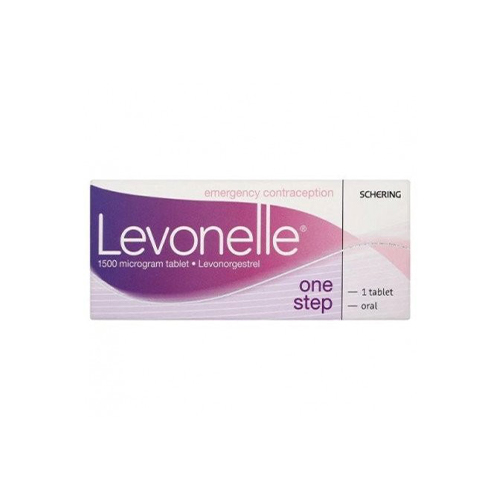- Single dose
- Effective morning after pill
- Effective for 3 days after sex
Levonelle
Levonelle tablets are an emergency contraceptive that can be used within 72 hours (3 days) of unprotected sex or if your usual contraceptive method has failed.
What is Levonelle?
Levonelle is commonly known as the “morning-after pill” and can be used by women to prevent pregnancy for up to 3 days after having unprotected sexual intercourse, or when regular contraceptive methods have failed.
It is most effective when taken as soon as possible after the event and is used in a single dose. It contains 1500mcg of the active ingredient levonorgestrel, which works effectively to prevent the actual fertilisation of the egg in the uterus.
It is claimed that Levonelle is around 95% effective if taken within the first 24 hours after unprotected sexual intercourse. The effectiveness does drop to around 85% between 24-48 hours, reducing to less than 70% after 48 hours.
So although it seems the odds are in your favour, it is important to know that most other regular methods of contraception are around 99% effective.
Can Levenolle protect against STIs?
No, unfortunately, Levonelle provides not protection against sexually transmitted infections, and a barrier contraceptive such as a condom is recommended to prevent infection. If you’ve already had unprotected sexual intercourse and are worried you might have contracted an STI, you should talk to your GP or take a test when possible.
How does Levonelle work?
Levonelle contains levonorgestrel, a synthetic version of the hormone progesterone hormone. Levonelle primarily works by preventing the release of an egg (ovulation). The levonorgestrel convinces the body that ovulation has already occurred, and therefore no further eggs are released for fertilisation.
Levonorgestrel also affects the consistency of the womb’s natural mucous, making it thicker and more difficult for sperm cells to enter the womb. Eggs, therefore, stand less of a chance of becoming fertilised if the sperm can’t survive.
You can take Levonelle more than once in a menstrual cycle. It does not interfere with your regular method of contraception.
Levonelle isn’t an abortion pill, and won’t terminate an existing pregnancy, so if an egg has already been fertilised before you’ve had a chance to take the pill, unfortunately, it won’t be effective and you’ll need to see your GP to talk about other options.
How to take Levonelle
When using this emergency contraceptive, the following usage instructions should be followed:
One 1500mcg Levonelle tablet should be swallowed with a glass of water as soon as possible after the event.
Levonelle One Step can be taken at any point during your menstrual cycle.
If you vomit within three hours of using the pill, contact your doctor as your body may not have fully absorbed the active ingredient yet and you may need a second dose.
If you are already taking a regular contraceptive pill, you should continue using it as normal.
Side effects & precautions
The most common side effects for Levonelle include tiredness, headache, nausea (feeling sick), abdominal pain, and irregular bleeding.
Levonorgestrel is safe for most women to take, including those who aren’t able to use hormonal birth control, as well as breastfeeding mothers. It mimics a hormone that’s naturally produced by the female body, but because the morning after pill comes in such a high dose, some women are advised to avoid it because of health reasons.
For example, women with the following conditions shouldn’t buy Levonelle without seeking advice from a doctor first:
- Disease of the small bowel (such as Crohn’s) that inhibits the absorption of drugs
- Severe liver problems
- History of ectopic pregnancy
- History of salpingitis
There are also some medicines that Levonorgestrel might interact with, meaning that it may affect the way other drugs work. This can be dangerous in some cases, so if you take any of the following medicines, you should speak to a doctor before you buy Levonelle, just to check that it’s safe for you to take:
–
- Barbituates
- Carbamazepine
- St Johns Wort
- Rifampicin
- Phenytoin
- Griseofulvin
- Cyclosporin
- Primidone
The good news is that if you don’t have any of the conditions listed in this section, and you aren’t taking any of the medicines above, levonorgestrel should be safe for you to take to prevent an unwanted pregnancy.
Download and read the attached patient information leaflet for more details.
Documentation
Levonelle Patient Information Leaflet (PIL)



We’re here to help.
Our friendly team is available to help Monday to Friday 9:00am - 5:00pm.
If you need urgent assistance, do not use this service. Call 111, or in an emergency call 999.

